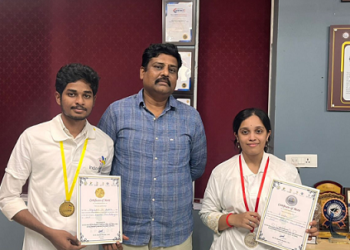In 2019, even though the COVID-19 pandemic set in, Kanika Das, a girl from Kuwari Gaon, a small village in Assam, enrolled in and completed a one-year diploma in Office Automation & Publishing from a reputed institute. She got a contract job in 2020 in a private firm as a Computer Data Operator.
Today, Kanika draws Rs 13,000 a month! A couple of years ago, nobody in her family would have dreamt of Kanika landing a job – leave alone a “computer job”, in a formal sector, as Kanika was a school dropout and was doing odd manual work to support her poor family of a mother, who is a widow, and five siblings.
Today, Kanika, one of the participants of our skill development initiatives, is living her dreams, even when the pandemic has painted a gloomy picture in every sphere of life. But for millions of boys and girls her age, especially those who are from a poor socio-economic background, their future is uncertain.
In India, the education of nearly 290 million children is severely disrupted. According to the Centre for Monitoring Indian Economy, the income of 97% households have declined since the outbreak of the pandemic – and the unemployment rate stands at over 12% (urban about 15% and rural 11%) as of June 2021.
But this phase of trials and tribulations also gives us an opportunity to identify emerging avenues that are opening up in skill development that are relevant for the post COVID-19 economy. It is a critical endeavour for a country.
How best it designs, plans, implements and evaluates its youth skilling initiatives can enable its future, since youth are its future. The skills could be technical, vocational education, creative or personality development. For skills development to be effective, we need to take into account the assessment of the aptitude at the individual level, identify their area of interest, respective skill gaps, and give training and opportunities for them to develop and hone those skills.
In the current scenario, there is an uptick in the demand for digital skills across the board, as the pandemic has accelerated the phase of digital transformation for all industries – big or small, manufacturing or services. But there is a huge skill gap in this domain. Hence, the youth skilling initiatives must give more weightage to the digital skills.
We give enough exposure to digital skills to about 7,000 students who are studying in the schools we run, and over 6,500 children who are being raised in our 32 children’s villages, under our ‘Family Like Care’ model where all round development of children including education, nutrition, health and psychological development is taken care of till they become self-reliant.
From the skilling perspective, we go by the five basic parameters: 1. ensuring that every child completes at least higher secondary education, 2. he or she is good at English communication, 3. has basic IT skills, 4. is good at social skills, and 5. has acquired a vocational and employable skill.
Considering the current pandemic and its effect on the job market, there is a need to build resilience in our youth, so that they are ready to face future disruptions. There is also a need to safeguard their mental health during these uncertain times with anxiety all around.
Another key aspect is values. Usually, the discussions on skill development revolve only around employable skills. Value education does not figure in the equation. But more often than not, it is one’s values that help the person enjoy long term success in career and personal and social life. In this context, the scope of skill development projects, whenever possible, can aim at getting the youth imbibe values of discipline, and at inculcating the attitude of continuous learning. In all our structured positive youth development programmes, we focus on the 4Cs of collaboration, creativity, compassion and confidence.
At SOS Children’s Villages of India, we directly touch the lives of about 28,500 children by offering them several customized care interventions such as Family Like Care, Family Strengthening, Kinship Care, Short Stay Homes, Foster Care, Education and Youth Skilling, Emergency Child Care and Special Needs Child Care.
The basket of these care solutions aims at transforming lives and developing children into self-reliant, employable and contributing members of society. Our chief means is to impart the youth with employability skills, as well as social skills and values of discipline, and continuous learning, which are essential for them to grow in their career – and for them to remain happy and successful forever.
(Authors views are personal)






















